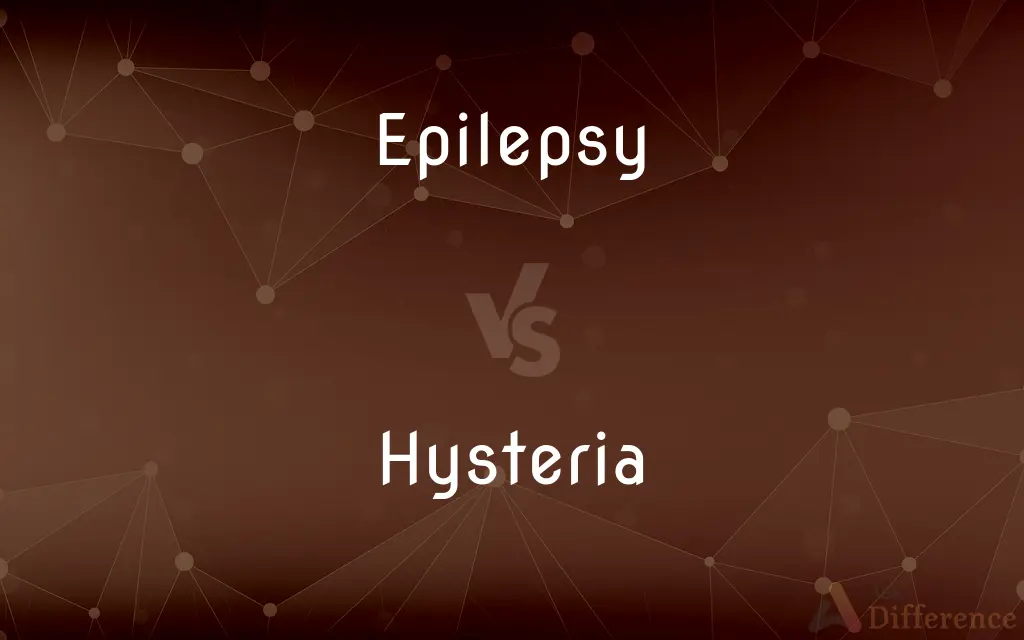Epilepsy vs. Hysteria — What's the Difference?
By Tayyaba Rehman & Fiza Rafique — Updated on March 13, 2024
Epilepsy is a neurological disorder characterized by recurrent seizures, while hysteria, now referred to as a dissociative or conversion disorder, involves psychological distress manifesting as physical symptoms.

Difference Between Epilepsy and Hysteria
Table of Contents
ADVERTISEMENT
Key Differences
Epilepsy involves the brain's electrical activity, leading to seizures with physical convulsions or momentary loss of awareness. Whereas hysteria, historically seen as a catch-all for various psychological disturbances, often results in physical symptoms without an organic cause, reflecting underlying psychological conflicts.
Epilepsy's diagnosis relies on medical tests like EEGs and brain scans to observe abnormal electrical activity. On the other hand, hysteria, or conversion disorder, is diagnosed primarily through psychological evaluation, ruling out neurological conditions.
Treatment for epilepsy often includes antiepileptic drugs to control seizures. In contrast, hysteria may involve psychotherapy, stress management, and sometimes medication for associated psychological issues like depression or anxiety.
Epilepsy can be triggered by factors like genetic predisposition, brain injury, or infections. Conversely, hysteria is often triggered by stress, traumatic events, or unresolved psychological conflicts, with no organic brain dysfunction.
While epilepsy's management focuses on preventing seizures and maintaining neurological health, hysteria's treatment aims at resolving underlying psychological issues and improving coping mechanisms.
ADVERTISEMENT
Comparison Chart
Definition
A neurological disorder with recurrent, unprovoked seizures.
A psychological disorder causing physical symptoms without an organic cause.
Cause
Brain abnormalities, genetic factors, brain injuries, infections.
Psychological factors like stress, trauma, unresolved conflicts.
Diagnosis
EEG, brain scans, medical history.
Psychological evaluation, excluding neurological conditions.
Symptoms
Seizures, convulsions, temporary confusion, staring spells.
Paralysis, numbness, blindness, movement disorders without neurological cause.
Treatment
Antiepileptic drugs, surgery, dietary changes, nerve stimulation.
Psychotherapy, stress management, medication for associated psychological conditions.
Compare with Definitions
Epilepsy
A chronic neurological condition characterized by recurrent seizures.
John's epilepsy meant he had to avoid flashing lights to prevent seizures.
Hysteria
A disorder where psychological stress manifests as physical symptoms.
After the car accident, Emma developed paralysis in her legs, diagnosed as hysteria.
Epilepsy
Seizures involve sudden bursts of electrical activity in the brain.
During an epilepsy seizure, Jane experienced uncontrollable jerking movements.
Hysteria
Symptoms of hysteria can include sudden blindness or paralysis without a medical cause.
Despite normal test results, Anna's sudden inability to walk was attributed to hysteria.
Epilepsy
Epilepsy can be diagnosed through EEG, capturing the brain's electrical signals.
Mike's diagnosis of epilepsy was confirmed after an abnormal EEG reading.
Hysteria
Hysteria is often treated with psychotherapy to address underlying issues.
Psychotherapy helped Tom overcome his hysteria-related speech difficulties.
Epilepsy
Treatment for epilepsy often includes medication to control seizures.
Lucy takes antiepileptic medication daily to manage her epilepsy.
Hysteria
Hysteria requires a diagnosis that excludes other neurological conditions.
Before diagnosing hysteria, doctors ruled out epilepsy in Jack's case through an EEG.
Epilepsy
Epilepsy triggers can include stress, lack of sleep, or alcohol consumption.
To manage his epilepsy, David ensures he gets enough sleep and avoids stress.
Hysteria
Stress and traumatic events can trigger hysteria symptoms.
Sara's hysteria, presenting as seizures, was triggered by extreme stress at work.
Epilepsy
Epilepsy is a group of neurological disorders characterized by recurrent epileptic seizures. Epileptic seizures are episodes that can vary from brief and nearly undetectable periods to long periods of vigorous shaking due to abnormal electrical activity in the brain.
Hysteria
Hysteria is a pejorative term used colloquially to mean ungovernable emotional excess and can refer to a temporary state of mind or emotion. In the 19th century, hysteria was considered a diagnosable physical illness in women.
Epilepsy
Any of various neurological disorders marked by sudden recurring attacks of motor, sensory, or cognitive dysfunction, with or without convulsive seizures or loss of consciousness. Also called seizure disorder.
Hysteria
Behavior exhibiting excessive or uncontrollable emotion, such as fear or panic.
Epilepsy
(pathology) A medical condition in which the sufferer experiences seizures (or convulsions) and blackouts.
Hysteria
A group of psychiatric symptoms, including heightened emotionality, attention-seeking behavior, and preoccupation with physical symptoms that may not be explainable by a medical condition. The term hysteria is no longer in clinical use, and such symptoms are currently attributed to any of several psychiatric conditions, including somatic symptom disorder, conversion disorder, and histrionic personality disorder.
Epilepsy
The "falling sickness," so called because the patient falls suddenly to the ground; a disease characterized by paroxysms (or fits) occurring at interval and attended by sudden loss of consciousness, and convulsive motions of the muscles.
Hysteria
Behavior exhibiting excessive or uncontrollable emotions, in a wide range from joy to panic but usually including anxiety or fear.
Epilepsy
A disorder of the central nervous system characterized by loss of consciousness and convulsions
Hysteria
A mental disorder characterized by emotional excitability etc. without an organic cause.
Hysteria
Synonym of conversion disorder
Hysteria
A nervous affection, occurring almost exclusively in women, in which the emotional and reflex excitability is exaggerated, and the will power correspondingly diminished, so that the patient loses control over the emotions, becomes the victim of imaginary sensations, and often falls into paroxism or fits.
Hysteria
State of violent mental agitation
Hysteria
Excessive or uncontrollable fear
Hysteria
Neurotic disorder characterized by violent emotional outbreaks and disturbances of sensory and motor functions
Common Curiosities
Can epilepsy be treated?
Yes, with medication, lifestyle changes, surgery, or nerve stimulation.
What triggers hysteria?
Often stress, traumatic events, or unresolved psychological conflicts.
Are there different types of seizures in epilepsy?
Yes, including focal seizures, generalized seizures, and unknown onset seizures.
What causes epilepsy?
Causes include genetic factors, brain trauma, infections, and brain conditions.
What is hysteria now known as?
It's commonly referred to as conversion disorder or functional neurological symptom disorder.
What is epilepsy?
Epilepsy is a neurological disorder characterized by recurrent, unprovoked seizures.
How is epilepsy diagnosed?
Through EEGs, brain imaging, and reviewing medical and family history.
What are common symptoms of hysteria?
Symptoms can include paralysis, numbness, blindness, or movement disorders.
How is hysteria (conversion disorder) diagnosed?
Primarily through psychological evaluation and ruling out neurological conditions.
Do epilepsy and hysteria share any common treatments?
While treatments differ, stress management can be beneficial in both.
Can physical symptoms in hysteria be severe?
Yes, they can be severe and significantly impair daily functioning.
How does epilepsy affect daily life?
It can affect driving, work, and require lifestyle changes to manage seizures.
Is there a stigma associated with both conditions?
Yes, both can carry social stigmas, affecting individuals' willingness to seek treatment.
Can hysteria lead to permanent symptoms?
Symptoms can persist, but they often improve with treatment.
Is hysteria treatable?
Yes, often through psychotherapy, stress management, and treating associated conditions.
Share Your Discovery

Previous Comparison
Stockist vs. Retailer
Next Comparison
Paxil vs. ZoloftAuthor Spotlight
Written by
Tayyaba RehmanTayyaba Rehman is a distinguished writer, currently serving as a primary contributor to askdifference.com. As a researcher in semantics and etymology, Tayyaba's passion for the complexity of languages and their distinctions has found a perfect home on the platform. Tayyaba delves into the intricacies of language, distinguishing between commonly confused words and phrases, thereby providing clarity for readers worldwide.
Co-written by
Fiza RafiqueFiza Rafique is a skilled content writer at AskDifference.com, where she meticulously refines and enhances written pieces. Drawing from her vast editorial expertise, Fiza ensures clarity, accuracy, and precision in every article. Passionate about language, she continually seeks to elevate the quality of content for readers worldwide.
















































